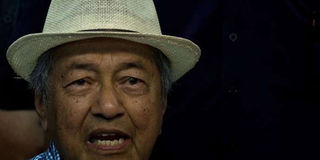Lessons from Malaysia and why people always choose protests despite brutality

Former Malaysian prime minister Mahathir Mohamad speaks with the media on the second day of the anti-government rally in Kuala Lumpur on August 30, 2015. PHOTO | MANAN VATSYAYANA |
What you need to know:
- By design, the so-called other channels to pass complains never work and mass action remain the last resort.
As Malaysian Prime Minister from 1981-2003, Dr Mahathir Mohammed was not exactly known for supporting human rights. He concentrated power in his office, weakened the judiciary, used ethnic divide and rule tactics and deployed the notorious Internal Security Act to detain critics without trial and intimidate dissenters.
He was also a leader of the “Asian values” campaign in the 1990s that tried to denigrate the universality of human rights, claiming Asians had their own value system that negated universal human rights — much like the selfish “African values” campaign started by some African autocrats.
The campaign failed as proponents were unable to explain what disentitled Asians to rights such as expression, fair trial, association, assembly, and right to vote.
So it was a huge surprise when Mahathir turned up at a massive demonstration last weekend in the capital Kuala Lumpur protesting alleged corruption by the government led by his one-time protégé Najib Razak.
The scandal started when the media discovered that Prime Minister Razak had $700 million (about Sh71.564 billion!!) in his personal accounts, suspected to have come from the debt-ridden state-funded Malaysian Development Berhad — which he chairs.
The Malaysian anti-corruption commission later claimed the funds were from “donors” without specifying them or what they got in return for such generosity.
Mahathir called for the resignation of the PM saying “the only way the people to get back to the old system is for them to remove this prime minister,” adding that“…to remove him, the people must show people’s power.”
Wow! Someone who loathed peaceful assemblies and criticism whilst in power now finds himself using the same rights he trampled on. But therein is the power of human rights. The rights to assemble, expression, association, and others are necessary for the powerless and marginalized. They need the rights, to challenge those in power abusing and fleecing them.
Of course the powerful detest protests and mass-action, for they are shown up, ridiculed and challenged in public, which hurts their huge egos. So they have been fighting back, using all manner of restrictive laws and practices against assemblies, and also against civil society organizations which are often at the forefront of agitation for the weak, powerless and marginalised.
Indeed, repressive governments frequently use the argument that people should use “other” channels to express their grievances. But they know, as Mahathir illustrated by turning up at the rally, that the decision to come out to protest--often in the shadow of anticipated police brutality--is a last resort used when these “other” channels fail.
Protests are being held across the world where the people power has been turned on the authorities denouncing their actions or omissions.
We can expect more protests over the next years, as governance continues its global deterioration. We will see more protests, globally, around the exploitation of natural resources, land disputes, environmental protection and wildlife conservation, migration, corruption, xenophobia, racism, and marginalisation. And of course we can expect protests around the “normal” issues of abuse of power, police brutality, and election fraud.
The fact is that peaceful protests are the most effective way of holding authorities accountable between elections. The powerful often suggest that opponents and dissenters should await the next elections to voice their views, knowing that the results of elections are frequently already pre-determined. But a democracy is known not just by the fact that regular elections are held, but by what happens between elections, and by how accountable the authorities are between elections.
Peaceful protests may be disruptive, raucous and messy. But the alternative of violent conflict is far worse as Syria has shown. We don’t have to like what peaceful protesters demand, but we need to keep the spaces open, for who knows when we will need it?





